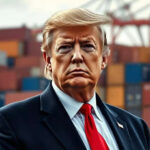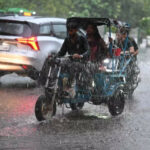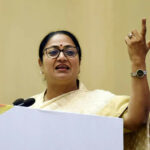Good morning from Strasbourg, where Ursula von der Leyen is quietly confident of winning a parliamentary majority for a second term as European Commission president. More on why below, plus a preview of a summit billed as Britain reopening its doors to Europe.
Dealmaker
The wheels are in motion in Strasbourg for Ursula von der Leyen to win a second term as president of the European Commission, with her backers increasingly confident she has the 361 votes needed for a majority in the European parliament, writes Andy Bounds.
Context: The German, who has run the commission since 2019, requires parliamentary approval in a lunchtime vote after being proposed by EU leaders. A series of deals between parties suggests the coalition behind her is likely to deliver.
Von der Leyen is set to announce the creation of dedicated commissioners for EU enlargement, defence and housing, and one to work with neighbourhood countries in the Mediterranean region who aren’t candidates to join the bloc, according to three people briefed on the preparations.
“There’s a line for every MEP” said someone familiar with the contents of von der Leyen’s speech, to be delivered this morning before the vote.
Von der Leyen’s European People’s party (EPP) together with the Socialists and the liberal Renew have 401 seats. But some national delegations within the groups — such as Ireland’s Fianna Fáil — have already said they will oppose her in the secret ballot.
So she needs outside help: from the Greens, with 53 MEPs, and the hard-right European Conservatives and Reformists (ECR). The latter is likely to add as many as 30 votes, including from Italian premier Giorgia Meloni’s Brothers of Italy.
Various votes for jobs in the parliament this week point to favours being traded ahead of today.
The Greens got a vice-president and two committee chairs despite being only the sixth largest of the eight parliamentary groups, and they are broadly expected to support von der Leyen.
ECR is divided in their intentions, but also won two vice-presidents, including an Italian, and got two committee chairs.
Renew, which has slipped from the third to the fifth-biggest group, received two vice-presidents and two committees, including the coveted security and defence committee and a special panel on safeguarding democracy.
Meanwhile the Socialists, who have five out of the 14 vice-presidents, had demanded the housing commissioner.
“There’s been some give and take,” said a party official involved in the talks.
Yesterday, a ruling by the EU’s general court that von der Leyen’s commission concealed details of its Covid-19 vaccine procurement contracts ruffled feathers, but ultimately the lack of transparency of today’s vote could be her trump card.
“The secret ballot helps her. There are Greens who might not want it known they voted for her,” said a commission official.
Chart du jour: Sous la Seine
Paris mayor Anne Hidalgo is so adamant to prove the Seine is safe for swimming that she took a dip herself. That means athletes in the upcoming Olympics won’t have an excuse not to compete in the river.
Vibe shift
Just a fortnight after he was elected, British Prime Minister Sir Keir Starmer will be in the hot seat hosting his first international summit today, hoping he can persuade EU partners to co-operate more closely on foreign affairs, writes Alice Hancock.
Context: The European Political Community, a brainchild of French President Emmanuel Macron, was inaugurated in Prague in 2022. The aim is to gather 47 leaders from the EU and its environs each six months to discuss key topics including migration, energy and defence.
“The EPC will fire the starting gun on this government’s new approach to Europe,” Starmer said last night. “European security will be at the forefront of this government’s foreign and defence priorities.”
Hosted at Blenheim Palace, birthplace of Sir Winston Churchill, it should prove an ideal opportunity for Starmer to show off his diplomatic chops and test his pledge to reset post-Brexit relations, after the Nato summit in Washington last week.
Some view the EPC as a mere talking shop, with one senior European official noting that “we’ve seen rather a lot of each other recently”.
Still, another senior official said the EU had been “very much pleased” with the way the summit was organised and that there were “good vibes” between Brussels and London.
Top of the agenda would be security, with a focus on how to counter foreign interference, the official said.
Tightening sanctions on Russia, particularly its shadow fleet of oil tankers, will also be on the menu alongside 800 scones, and a possible debate over whether Hungary should be allowed to host the next EPC in November, despite Premier Viktor Orbán’s recent unsanctioned diplomatic adventures.
What to watch today
-
European parliament elects the next European Commission president. Vote at 1pm, results from 14.30pm CET.
-
European Political Community meets in Oxford.
Now read these
-
Power dynamics: New lawmakers in France are seeking alliances to snag the prestigious post of president of the National Assembly.
-
Can’t see the deforestation for the trees: The EU’s policies on climate, trade and development are incoherent, argues Alan Beattie.
-
At what cost? Dior pays its suppliers €53 for a handbag it sells at €2,000. Italy’s competition watchdog has launched an investigation.
Recommended newsletters for you
Are you enjoying Europe Express? Sign up here to have it delivered straight to your inbox every workday at 7am CET and on Saturdays at noon CET. Do tell us what you think, we love to hear from you: europe.express@ft.com. Keep up with the latest European stories @FT Europe






